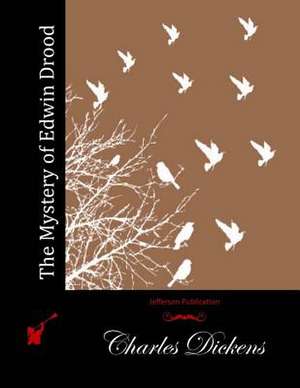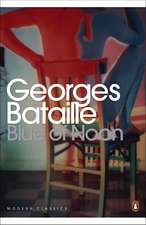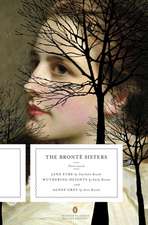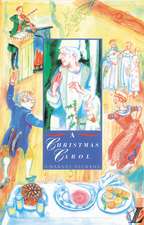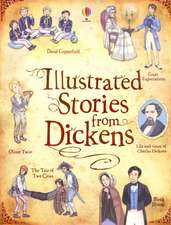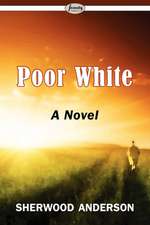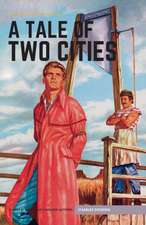The Mystery of Edwin Drood
Autor Charles Dickensen Limba Engleză Paperback
| Toate formatele și edițiile | Preț | Express |
|---|---|---|
| Paperback (36) | 47.61 lei 10-16 zile | +16.80 lei 5-11 zile |
| Oxford University Press – 26 mar 2009 | 47.61 lei 10-16 zile | +16.80 lei 5-11 zile |
| Penguin Books – 27 mar 2002 | 50.56 lei 25-31 zile | +21.72 lei 5-11 zile |
| CREATESPACE – | 51.36 lei 22-36 zile | |
| CreateSpace Independent Publishing Platform – | 52.93 lei 22-36 zile | |
| CREATESPACE – | 56.88 lei 22-36 zile | |
| CREATESPACE – | 64.87 lei 22-36 zile | |
| – | 70.84 lei 22-36 zile | |
| CREATESPACE – | 78.57 lei 22-36 zile | |
| CREATESPACE – | 78.61 lei 22-36 zile | |
| – | 86.66 lei 22-36 zile | |
| CREATESPACE – | 87.42 lei 22-36 zile | |
| CREATESPACE – | 95.45 lei 22-36 zile | |
| – | 104.62 lei 22-36 zile | |
| CREATESPACE – | 104.65 lei 22-36 zile | |
| KUPERARD (BRAVO LTD) – 29 oct 2009 | 107.87 lei 22-36 zile | |
| CREATESPACE – | 126.53 lei 22-36 zile | |
| – | 127.08 lei 22-36 zile | |
| Hansebooks – 27 iun 2016 | 239.44 lei 22-36 zile | |
| CreateSpace Independent Publishing Platform – | 74.12 lei 43-57 zile | |
| Digireads.com – 17 dec 2019 | 81.94 lei 43-57 zile | |
| – | 85.11 lei 43-57 zile | |
| – | 88.32 lei 43-57 zile | |
| – | 94.77 lei 43-57 zile | |
| – | 99.07 lei 43-57 zile | |
| Ebury Publishing – 4 ian 2012 | 99.92 lei 43-57 zile | |
| Blurb – 6 feb 2019 | 107.28 lei 38-44 zile | |
| Blurb – 6 feb 2019 | 125.45 lei 38-44 zile | |
| Throne Classics – 9 iul 2019 | 137.26 lei 38-44 zile | |
| Kessinger Publishing – 10 mai 2009 | 162.66 lei 38-44 zile | |
| Book Jungle – 6 apr 2009 | 171.48 lei 43-57 zile | |
| Echo Library – 30 iun 2003 | 174.65 lei 38-44 zile | |
| Hansebooks – 13 apr 2016 | 212.35 lei 43-57 zile | |
| Echo Library – 31 mar 2006 | 228.95 lei 38-44 zile | |
| Kessinger Publishing – 29 ian 2010 | 235.49 lei 38-44 zile | |
| TREDITION CLASSICS – 31 dec 2012 | 260.31 lei 43-57 zile | |
| Kessinger Publishing – 29 ian 2010 | 306.51 lei 38-44 zile | |
| Hardback (5) | 83.30 lei 25-31 zile | +34.53 lei 5-11 zile |
| EVERYMAN – 4 noi 2004 | 83.30 lei 25-31 zile | +34.53 lei 5-11 zile |
| Everyman's Library – 31 oct 2004 | 121.47 lei 22-36 zile | |
| Throne Classics – 9 iul 2019 | 201.22 lei 38-44 zile | |
| TREDITION CLASSICS – 31 dec 2012 | 338.91 lei 43-57 zile | |
| OUP OXFORD – 19 iul 1972 | 352.97 lei 31-37 zile |
Preț: 52.93 lei
Nou
Puncte Express: 79
Preț estimativ în valută:
10.13€ • 10.51$ • 8.47£
10.13€ • 10.51$ • 8.47£
Carte disponibilă
Livrare economică 24 februarie-10 martie
Preluare comenzi: 021 569.72.76
Specificații
ISBN-13: 9781512084627
ISBN-10: 151208462X
Pagini: 102
Dimensiuni: 216 x 279 x 5 mm
Greutate: 0.26 kg
Editura: CreateSpace Independent Publishing Platform
ISBN-10: 151208462X
Pagini: 102
Dimensiuni: 216 x 279 x 5 mm
Greutate: 0.26 kg
Editura: CreateSpace Independent Publishing Platform
Descriere
Descriere de la o altă ediție sau format:
'Where is my nephew?, asked Mr Jasper, wildly. 'Where is your nephew?' repeated Neveille. 'Why do you ask me?' 'I ask you,' retorted Jasper, 'because you were the last person in his company, and he is not to be found.' The Mystery of Edwin Drood, Dickens's last novel, lay unfinished at his death. Speculation remains rife as to its probably conclusion; evidence suggests that, fascinated as Dickens was by details of the plotting, his basic concern was for character and appropriate setting, in particular the character of the hero-villain, Jasper. The ancient city of Cloisterham, its cathedral a reminder of mortality, human frailty, and the lawful life, is an effective background for what Dickens daughter called a tale of 'the tragic secrets of the human heart'. Humour is provided by a host of characters ranging fro Mr Grewgious, the admirable though eccentric lawyer, and Miss Twinkleton, guardian of the Young Ladies' Seminary, to Durdles, the hard-drinking stonemason, and Deputy, the irreverent lodging-house boy. This edition contains Dickens's working plans for the novel, and the text is that of the authoritative Clarendon edition. ABOUT THE SERIES: For over 100 years Oxford World's Classics has made available the widest range of literature from around the globe. Each affordable volume reflects Oxford's commitment to scholarship, providing the most accurate text plus a wealth of other valuable features, including expert introductions by leading authorities, helpful notes to clarify the text, up-to-date bibliographies for further study, and much more.
'Where is my nephew?, asked Mr Jasper, wildly. 'Where is your nephew?' repeated Neveille. 'Why do you ask me?' 'I ask you,' retorted Jasper, 'because you were the last person in his company, and he is not to be found.' The Mystery of Edwin Drood, Dickens's last novel, lay unfinished at his death. Speculation remains rife as to its probably conclusion; evidence suggests that, fascinated as Dickens was by details of the plotting, his basic concern was for character and appropriate setting, in particular the character of the hero-villain, Jasper. The ancient city of Cloisterham, its cathedral a reminder of mortality, human frailty, and the lawful life, is an effective background for what Dickens daughter called a tale of 'the tragic secrets of the human heart'. Humour is provided by a host of characters ranging fro Mr Grewgious, the admirable though eccentric lawyer, and Miss Twinkleton, guardian of the Young Ladies' Seminary, to Durdles, the hard-drinking stonemason, and Deputy, the irreverent lodging-house boy. This edition contains Dickens's working plans for the novel, and the text is that of the authoritative Clarendon edition. ABOUT THE SERIES: For over 100 years Oxford World's Classics has made available the widest range of literature from around the globe. Each affordable volume reflects Oxford's commitment to scholarship, providing the most accurate text plus a wealth of other valuable features, including expert introductions by leading authorities, helpful notes to clarify the text, up-to-date bibliographies for further study, and much more.
Notă biografică
The story of 'A Tale of Two Cities' is set in the late 18th Century in London and Paris, before and during the French Revolution. It was a time when injustice was met by a lust for vengeance, and rarely was a distinction made between the innocent and the guilty. It was published in weekly installments from April 1859 to November 1859 in Dickens's new literary periodical titled 'All the Year Round'. This novel is regarded as one of Dickens's most popular and most innovative works.After eighteen years as a political prisoner in the Bastille the aging Dr Manette is finally released and reunited with his daughter in England. There, two very different men, Charles Darnay, an exiled French aristocrat, and Sydney Carton, a disreputable but brilliant English lawyer, become enmeshed through their love for Lucie Manette. From the tranquil lanes of London, they are all drawn against their will to the vengeful, bloodstained streets of Paris at the height of the Reign of Terror and soon fall under the lethal shadow of La Guillotine.The book is perhaps best known for its opening lines, "It was the best of times, it was the worst of times," and for Carton's last speech, in which he says of his replacing Darnay in a prison cell, "It is a far, far better thing that I do, than I have ever done it is a far, far better rest that I go to, than I have ever known."About the AuthorCharles John Huffam Dickens (7 February 1812 - 9 June 1870) was an English writer and social critic. He created some of the world's best-known fictional characters and is regarded as the greatest novelist of the Victorian era. His works enjoyed unprecedented popularity during his lifetime, and by the twentieth century critics and scholars had recognised him as a literary genius. His novels and short stories enjoy lasting popularity. Born in Portsmouth, Dickens left school to work in a factory when his father was incarcerated in a debtors' prison. Despite his lack of formal education, he edited a weekly journal for 20 years, wrote 15 novels, five novellas, hundreds of short stories and non-fiction articles, lectured and performed extensively, was an indefatigable letter writer, and campaigned vigorously for children's rights, education, and other social reforms.
Extras
Chapter One
The Dawn
An ancient English Cathedral Town? How can the ancient English Cathedral town be here! The well-known massive grey square tower of its old Cathedral? How can that be here! There is no spike of rusty iron in the air, between the eye and it, from any point of the real prospect. What IS the spike that intervenes, and who has set it up? Maybe, it is set up by the Sultan’s orders for the impaling of a horde of Turkish robbers, one by one. It is so, for cymbals clash, and the Sultan goes by to his palace in long procession. Ten thousand scimitars flash in the sunlight, and thrice ten thousand dancing- girls strew flowers. Then, follow white elephants caparisoned in countless gorgeous colors, and infinite in number and attendants. Still, the Cathedral Tower rises in the background, where it cannot be, and still no writhing figure is on the grim spike. Stay! Is the spike so low a thing as the rusty spike on the top of a post of an old bedstead that has tumbled all awry? Some vague period of drowsy laughter must be devoted to the consideration of this possibility.
Shaking from head to foot, the man whose scattered consciousness has thus fantastically pieced itself together, at length rises, supports his trembling frame upon his arms, and looks around. He is in the meanest and closest of small rooms. Through the ragged window- curtain, the light of early day steals in from a miserable court. He lies, dressed, across a large unseemly bed, upon a bedstead that has indeed given way under the weight upon it. Lying, also dressed and also across the bed, not longwise, are a Chinaman, a Lascar, and a haggard woman. The two first are in a sleep or stupor; the last is blowing at a kind of pipe, to kindle it. And as she blows, and shading it with her lean hand, concentrates its red spark of light, it serves in the dim morning as a lamp to show him what he sees of her.
“Another?” says this woman, in a querulous, rattling whisper. “Have another?”
He looks about him, with his hand to his forehead.
“Ye’ve smoked as many as five since ye come in at midnight,” the woman goes on, as she chronically complains. “Poor me, poor me, my head is so bad! Them two come in after ye. Ah, poor me, the business is slack, is slack! Few Chinamen about the Docks, and fewer Lascars, and no ships coming in, these say! Here’s another ready for ye, dreary. Ye’ll remember like a good soul, won’t ye, that the market price is
dreffle high just now? More than three shillings and sixpence for a thimbleful! And ye’ll remember that nobody but me (and Jack Chinaman t’other side the court; but he can’t do it as well as me) has the true secret of mixing it? Ye’ll pay up according, dreary, won’t ye?”
She blows at the pipe as she speaks, and, occasionally bubbling at it, inhales much of its contents.
“O me, O me, my lungs is weak, my lungs is bad! It’s nearly ready for ye, dreary. Ah poor me, poor me, my poor hand shakes like to drop off! I see ye coming-to, and I ses to my poor self, ‘I’ll have another ready for him, and he’ll bear in mind the market price of opium, and pay according.’ O my poor head! I makes my pipes of old penny ink-bottles, ye see, dreary—this is one—and I fits in a mouthpiece, this way, and I takes my mixter out of this thimble with this little horn spoon; and so I fills, deary. Ah, my poor nerves! I got Heavens-hard drunk for sixteen year afore I took to this; but this don’t hurt me, not to speak of. And it takes away the hunger as well as wittles, deary.”
She hands him the nearly-emptied pipe, and sinks back, turning over on her face.
He rises unsteadily from the bed, lays the pipe upon the hearthstone, draws back the ragged curtain, and looks with repugnance at his three companions. He notices that the woman has opium-smoked herself into a strange likeness of the Chinaman. His form of cheek, eye, and temple, and his color, are repeated in her. Said Chinaman convulsively wrestles with one of his many Gods, or Devils, perhaps, and snarls horribly. The Lascar laughs and dribbles at the mouth. The hostess is still.
“What visions can she have?” the waking man muses, as he turns her face towards him, and stands looking down at it. “Visions of many butchers’ shops, and public-houses, and much credit? Of an increase of hideous customers, and this horrible bedstead set upright again, and this horrible court swept clean? What can she rise to, under any quantity of opium, higher than that!—Eh?”
He bends down his ear, to listen to her mutterings.
“Unintelligible!”
As he watches the spasmodic shoots and darts that break out of her face and limbs, like fitful lightning out of a dark sky, some contagion in them seizes upon him: insomuch that he has to withdraw himself to a lean arm-chair by the hearth—placed there, perhaps, for such emergencies—and to sit in it, holding tight, until he has got the better of this unclean spirit of imitation.
Then he comes back, pounces on the Chinaman, and, seizing him with both hands by the throat, turns him violently on the bed. The Chinaman clutches the aggressive hands, resists, gasps, and protests.
“What do you say?”
A watchful pause.
“Unintelligible!”
Slowly loosening his grasp as he listens to the incoherent jargon with an attentive frown, he turns to the Lascar and fairly drags him forth upon the floor. As he falls, the Lascar starts into a half- risen attitude, glares with his eyes, lashes about him fiercely with his arms, and draws a phantom knife. It then becomes apparent that the woman has taken possession of his knife, for safety’s sake; for, she too starting up, and restraining and expostulating with him, the knife is visible in her dress, not in his, when they drowsily drop back, side by side.
There has been chattering and clattering enough between them, but to no purpose. When any distinct word has been flung into the air, it has had no sense or sequence. Wherefore “unintelligible!” is again the comment of the watcher, made with some reassured nodding of his head, and a gloomy smile. He then lays certain silver money on the table, finds his hat, gropes his way down the broken stairs, gives a good morning to some rat-ridden doorkeeper, in bed in a black hutch beneath the stairs, and passes out.
That same afternoon, the massive grey square tower of an old Cathedral rises before the sight of a jaded traveller. The bells are going for daily vesper service, and he must needs attend it, one would say, from his haste to reach the open cathedral door. The choir are getting on their sullied white robes, in a hurry, when he arrives among them, gets on his own robe, and falls into the procession filing in to service. Then, the Sacristan locks the iron-barred gates that divide the sanctuary from the chancel, and all of the procession having scuttled into their places, hide their faces; and then the intoned words, “When the Wicked Man—” rise among groins of arches and beams of roof, awakening muttered thunder.
Chapter Two
A Dean, and a Chapter Also
Whosoever has observed that sedate and clerical bird, the rook, may perhaps have noticed that when he wings his way homeward towards nightfall, in a sedate and clerical company, two rooks will suddenly detach themselves from the rest, will retrace their flight for some distance, and will there poise and linger; conveying to mere men the fancy that it is of some occult importance to the body politic, that this artful couple should pretend to have renounced connection with it.
Similarly, service being over in the old cathedral with the square tower, and the choir scuffling out again, and divers venerable persons of rook-like aspect dispersing, two of these latter retrace their steps, and walk together in the echoing Close.
Not only is the day waning, but the year. The low sun is fiery and yet cold behind the monastery ruin, and the Virginia creeper on the cathedral wall has showered half its deep-red leaves down on the pavement. There has been rain this afternoon, and a wintry shudder goes among the little pools on the cracked uneven flagstones, and through the giant elm trees as they shed a gust of tears. Their fallen leaves lie strewn thickly about. Some of these leaves, in a timid rush, seek sanctuary within the low arched cathedral door; but two men coming out, resist them, and cast them forth again with their feet; this done, one of the two locks the door with a goodly key, and the other flits away with a folio music book.
“Mr. Jasper was that, Tope?”
“Yes, Mr. Dean.”
“He has stayed late.”
“Yes, Mr. Dean. I have stayed for him, your Reverence. He has been took a little poorly.”
“Say ‘taken,’ Tope—to the Dean,” the younger rook interposes in a low tone with this touch of correction, as who should say: “You may offer bad grammar to the laity, or the humbler clergy not to the Dean.”
Mr. Tope, Chief Verger and Showman, and accustomed to be high with excursion parties, declines with a silent loftiness to perceive that any suggestion has been tendered to him.
“And when and how has Mr. Jasper been taken—for, as Mr. Crisparkle has remarked, it is better to say taken—taken—” repeats the Dean; “when and how has Mr. Jasper been Taken—”
“Taken, sir,” Tope deferentially murmurs.
“—Poorly, Tope?”
“Why, sir, Mr. Jasper was that breathed—”
“I wouldn’t say ‘That breathed,’ Tope,” Mr. Crisparkle interposes, with the same touch as before. “Not English—to the Dean.”
“Breathed to that extent,” the Dean (not unflattered by this indirect homage), condescendingly remarks, “would be preferable.”
“Mr. Jasper’s breathing was so remarkably short;” thus discreetly does Mr. Tope work his way round the sunken rock, “when he came in, that it distressed him mightily to get his notes out: which was perhaps the cause of his having a kind of fit on him after a little. His memory grew Dazed.” Mr. Tope, with his eyes on the Reverend Mr. Crisparkle, shoots this word out, as defying him to improve upon it: “and a dimness and giddiness crept over him as strange as ever I saw: though he didn’t seem to mind it particularly, himself. However, a little time and a little water brought him out of his Daze.” Mr. Tope repeats the word and its emphasis, with the air of saying: “As I have made a success, I’ll make it again.”
“And Mr. Jasper has gone home quite himself, has he?” asks the Dean.
“Your Reverence, he has gone home quite himself. And I’m glad to see he’s having his fire kindled up, for it’s chilly after the wet, and the Cathedral had both a damp feel and a damp touch this afternoon, and he was very shivery.”
They all three look towards an old stone gatehouse crossing the Close, with an arched thoroughfare passing beneath it. Through its latticed window, a fire shines out upon the fast-darkening scene, involving in shadow the pendent masses of ivy and creeper covering the building’s front. As the deep Cathedral-bell strikes the hour, a ripple of wind goes through these at their distance, like a ripple of the solemn sound that hums through tomb and tower, broken niche and defaced statue, in the pile close at hand.
“Is Mr. Jasper’s nephew with him?” the Dean asks.
“No, sir,” replies the Verger, “but expected. There’s his own solitary shadow betwixt his two windows—the one looking this way, and the one looking down into the High Street—drawing his own curtains now.”
“Well, well,” says the Dean, with a sprightly air of breaking up the little conference, “I hope Mr. Jasper’s heart may not be too much set upon his nephew. Our affections, however laudable, in this transitory world, should never master us; we should guide them, guide them. I find I am not disagreeably reminded of my dinner, by hearing my dinner-bell. Perhaps Mr. Crisparkle you will, before going home, look in on Jasper?”
“Certainly, Mr. Dean. And tell him that you had the kindness to desire to know how he was?”
“Ay; do so, do so. Certainly. Wished to know how he was. By all means. Wished to know how he was.”
With a pleasant air of patronage, the Dean as nearly cocks his quaint hat as a Dean in good spirits may, and directs his comely gaiters towards the ruddy dining-room of the snug old red-brick house where he is at present “in residence” with Mrs. Dean and Miss Dean.
Mr. Crisparkle, Minor Canon, fair and rosy, and perpetually pitching himself head-foremost into all the deep running water in the surrounding country; Mr. Crisparkle, Minor Canon, early riser, musical, classical, cheerful, kind, good-natured, social, contented, and boy-like; Mr. Crisparkle, Minor Canon and good man, lately “Coach” upon the chief Pagan high roads, but since promoted by a patron (grateful for a well-taught son) to his present Christian beat; betakes himself to the gate house, on his way home to his early tea.
“Sorry to hear from Tope that you have not been well, Jasper.”
“Oh, it was nothing, nothing!”
“You look a little worn.”
“Do I? Oh, I don’t think so. What is better, I don’t feel so. Tope has made too much of it I suspect. It’s his trade to make the most of everything appertaining to the Cathedral, you know.”
“I may tell the Dean—I call expressly from the Dean—that you are all right again?”
The reply, with a slight smile, is: “Certainly; with my respects and thanks to the Dean.”
“I’m glad to hear that you expect young Drood.”
“I expect the dear fellow every moment.”
“Ah! He will do you more good than a doctor, Jasper.”
“More good than a dozen doctors. For I love him dearly, and I don’t love doctors, or doctors’ stuff.”
From the Trade Paperback edition.
The Dawn
An ancient English Cathedral Town? How can the ancient English Cathedral town be here! The well-known massive grey square tower of its old Cathedral? How can that be here! There is no spike of rusty iron in the air, between the eye and it, from any point of the real prospect. What IS the spike that intervenes, and who has set it up? Maybe, it is set up by the Sultan’s orders for the impaling of a horde of Turkish robbers, one by one. It is so, for cymbals clash, and the Sultan goes by to his palace in long procession. Ten thousand scimitars flash in the sunlight, and thrice ten thousand dancing- girls strew flowers. Then, follow white elephants caparisoned in countless gorgeous colors, and infinite in number and attendants. Still, the Cathedral Tower rises in the background, where it cannot be, and still no writhing figure is on the grim spike. Stay! Is the spike so low a thing as the rusty spike on the top of a post of an old bedstead that has tumbled all awry? Some vague period of drowsy laughter must be devoted to the consideration of this possibility.
Shaking from head to foot, the man whose scattered consciousness has thus fantastically pieced itself together, at length rises, supports his trembling frame upon his arms, and looks around. He is in the meanest and closest of small rooms. Through the ragged window- curtain, the light of early day steals in from a miserable court. He lies, dressed, across a large unseemly bed, upon a bedstead that has indeed given way under the weight upon it. Lying, also dressed and also across the bed, not longwise, are a Chinaman, a Lascar, and a haggard woman. The two first are in a sleep or stupor; the last is blowing at a kind of pipe, to kindle it. And as she blows, and shading it with her lean hand, concentrates its red spark of light, it serves in the dim morning as a lamp to show him what he sees of her.
“Another?” says this woman, in a querulous, rattling whisper. “Have another?”
He looks about him, with his hand to his forehead.
“Ye’ve smoked as many as five since ye come in at midnight,” the woman goes on, as she chronically complains. “Poor me, poor me, my head is so bad! Them two come in after ye. Ah, poor me, the business is slack, is slack! Few Chinamen about the Docks, and fewer Lascars, and no ships coming in, these say! Here’s another ready for ye, dreary. Ye’ll remember like a good soul, won’t ye, that the market price is
dreffle high just now? More than three shillings and sixpence for a thimbleful! And ye’ll remember that nobody but me (and Jack Chinaman t’other side the court; but he can’t do it as well as me) has the true secret of mixing it? Ye’ll pay up according, dreary, won’t ye?”
She blows at the pipe as she speaks, and, occasionally bubbling at it, inhales much of its contents.
“O me, O me, my lungs is weak, my lungs is bad! It’s nearly ready for ye, dreary. Ah poor me, poor me, my poor hand shakes like to drop off! I see ye coming-to, and I ses to my poor self, ‘I’ll have another ready for him, and he’ll bear in mind the market price of opium, and pay according.’ O my poor head! I makes my pipes of old penny ink-bottles, ye see, dreary—this is one—and I fits in a mouthpiece, this way, and I takes my mixter out of this thimble with this little horn spoon; and so I fills, deary. Ah, my poor nerves! I got Heavens-hard drunk for sixteen year afore I took to this; but this don’t hurt me, not to speak of. And it takes away the hunger as well as wittles, deary.”
She hands him the nearly-emptied pipe, and sinks back, turning over on her face.
He rises unsteadily from the bed, lays the pipe upon the hearthstone, draws back the ragged curtain, and looks with repugnance at his three companions. He notices that the woman has opium-smoked herself into a strange likeness of the Chinaman. His form of cheek, eye, and temple, and his color, are repeated in her. Said Chinaman convulsively wrestles with one of his many Gods, or Devils, perhaps, and snarls horribly. The Lascar laughs and dribbles at the mouth. The hostess is still.
“What visions can she have?” the waking man muses, as he turns her face towards him, and stands looking down at it. “Visions of many butchers’ shops, and public-houses, and much credit? Of an increase of hideous customers, and this horrible bedstead set upright again, and this horrible court swept clean? What can she rise to, under any quantity of opium, higher than that!—Eh?”
He bends down his ear, to listen to her mutterings.
“Unintelligible!”
As he watches the spasmodic shoots and darts that break out of her face and limbs, like fitful lightning out of a dark sky, some contagion in them seizes upon him: insomuch that he has to withdraw himself to a lean arm-chair by the hearth—placed there, perhaps, for such emergencies—and to sit in it, holding tight, until he has got the better of this unclean spirit of imitation.
Then he comes back, pounces on the Chinaman, and, seizing him with both hands by the throat, turns him violently on the bed. The Chinaman clutches the aggressive hands, resists, gasps, and protests.
“What do you say?”
A watchful pause.
“Unintelligible!”
Slowly loosening his grasp as he listens to the incoherent jargon with an attentive frown, he turns to the Lascar and fairly drags him forth upon the floor. As he falls, the Lascar starts into a half- risen attitude, glares with his eyes, lashes about him fiercely with his arms, and draws a phantom knife. It then becomes apparent that the woman has taken possession of his knife, for safety’s sake; for, she too starting up, and restraining and expostulating with him, the knife is visible in her dress, not in his, when they drowsily drop back, side by side.
There has been chattering and clattering enough between them, but to no purpose. When any distinct word has been flung into the air, it has had no sense or sequence. Wherefore “unintelligible!” is again the comment of the watcher, made with some reassured nodding of his head, and a gloomy smile. He then lays certain silver money on the table, finds his hat, gropes his way down the broken stairs, gives a good morning to some rat-ridden doorkeeper, in bed in a black hutch beneath the stairs, and passes out.
That same afternoon, the massive grey square tower of an old Cathedral rises before the sight of a jaded traveller. The bells are going for daily vesper service, and he must needs attend it, one would say, from his haste to reach the open cathedral door. The choir are getting on their sullied white robes, in a hurry, when he arrives among them, gets on his own robe, and falls into the procession filing in to service. Then, the Sacristan locks the iron-barred gates that divide the sanctuary from the chancel, and all of the procession having scuttled into their places, hide their faces; and then the intoned words, “When the Wicked Man—” rise among groins of arches and beams of roof, awakening muttered thunder.
Chapter Two
A Dean, and a Chapter Also
Whosoever has observed that sedate and clerical bird, the rook, may perhaps have noticed that when he wings his way homeward towards nightfall, in a sedate and clerical company, two rooks will suddenly detach themselves from the rest, will retrace their flight for some distance, and will there poise and linger; conveying to mere men the fancy that it is of some occult importance to the body politic, that this artful couple should pretend to have renounced connection with it.
Similarly, service being over in the old cathedral with the square tower, and the choir scuffling out again, and divers venerable persons of rook-like aspect dispersing, two of these latter retrace their steps, and walk together in the echoing Close.
Not only is the day waning, but the year. The low sun is fiery and yet cold behind the monastery ruin, and the Virginia creeper on the cathedral wall has showered half its deep-red leaves down on the pavement. There has been rain this afternoon, and a wintry shudder goes among the little pools on the cracked uneven flagstones, and through the giant elm trees as they shed a gust of tears. Their fallen leaves lie strewn thickly about. Some of these leaves, in a timid rush, seek sanctuary within the low arched cathedral door; but two men coming out, resist them, and cast them forth again with their feet; this done, one of the two locks the door with a goodly key, and the other flits away with a folio music book.
“Mr. Jasper was that, Tope?”
“Yes, Mr. Dean.”
“He has stayed late.”
“Yes, Mr. Dean. I have stayed for him, your Reverence. He has been took a little poorly.”
“Say ‘taken,’ Tope—to the Dean,” the younger rook interposes in a low tone with this touch of correction, as who should say: “You may offer bad grammar to the laity, or the humbler clergy not to the Dean.”
Mr. Tope, Chief Verger and Showman, and accustomed to be high with excursion parties, declines with a silent loftiness to perceive that any suggestion has been tendered to him.
“And when and how has Mr. Jasper been taken—for, as Mr. Crisparkle has remarked, it is better to say taken—taken—” repeats the Dean; “when and how has Mr. Jasper been Taken—”
“Taken, sir,” Tope deferentially murmurs.
“—Poorly, Tope?”
“Why, sir, Mr. Jasper was that breathed—”
“I wouldn’t say ‘That breathed,’ Tope,” Mr. Crisparkle interposes, with the same touch as before. “Not English—to the Dean.”
“Breathed to that extent,” the Dean (not unflattered by this indirect homage), condescendingly remarks, “would be preferable.”
“Mr. Jasper’s breathing was so remarkably short;” thus discreetly does Mr. Tope work his way round the sunken rock, “when he came in, that it distressed him mightily to get his notes out: which was perhaps the cause of his having a kind of fit on him after a little. His memory grew Dazed.” Mr. Tope, with his eyes on the Reverend Mr. Crisparkle, shoots this word out, as defying him to improve upon it: “and a dimness and giddiness crept over him as strange as ever I saw: though he didn’t seem to mind it particularly, himself. However, a little time and a little water brought him out of his Daze.” Mr. Tope repeats the word and its emphasis, with the air of saying: “As I have made a success, I’ll make it again.”
“And Mr. Jasper has gone home quite himself, has he?” asks the Dean.
“Your Reverence, he has gone home quite himself. And I’m glad to see he’s having his fire kindled up, for it’s chilly after the wet, and the Cathedral had both a damp feel and a damp touch this afternoon, and he was very shivery.”
They all three look towards an old stone gatehouse crossing the Close, with an arched thoroughfare passing beneath it. Through its latticed window, a fire shines out upon the fast-darkening scene, involving in shadow the pendent masses of ivy and creeper covering the building’s front. As the deep Cathedral-bell strikes the hour, a ripple of wind goes through these at their distance, like a ripple of the solemn sound that hums through tomb and tower, broken niche and defaced statue, in the pile close at hand.
“Is Mr. Jasper’s nephew with him?” the Dean asks.
“No, sir,” replies the Verger, “but expected. There’s his own solitary shadow betwixt his two windows—the one looking this way, and the one looking down into the High Street—drawing his own curtains now.”
“Well, well,” says the Dean, with a sprightly air of breaking up the little conference, “I hope Mr. Jasper’s heart may not be too much set upon his nephew. Our affections, however laudable, in this transitory world, should never master us; we should guide them, guide them. I find I am not disagreeably reminded of my dinner, by hearing my dinner-bell. Perhaps Mr. Crisparkle you will, before going home, look in on Jasper?”
“Certainly, Mr. Dean. And tell him that you had the kindness to desire to know how he was?”
“Ay; do so, do so. Certainly. Wished to know how he was. By all means. Wished to know how he was.”
With a pleasant air of patronage, the Dean as nearly cocks his quaint hat as a Dean in good spirits may, and directs his comely gaiters towards the ruddy dining-room of the snug old red-brick house where he is at present “in residence” with Mrs. Dean and Miss Dean.
Mr. Crisparkle, Minor Canon, fair and rosy, and perpetually pitching himself head-foremost into all the deep running water in the surrounding country; Mr. Crisparkle, Minor Canon, early riser, musical, classical, cheerful, kind, good-natured, social, contented, and boy-like; Mr. Crisparkle, Minor Canon and good man, lately “Coach” upon the chief Pagan high roads, but since promoted by a patron (grateful for a well-taught son) to his present Christian beat; betakes himself to the gate house, on his way home to his early tea.
“Sorry to hear from Tope that you have not been well, Jasper.”
“Oh, it was nothing, nothing!”
“You look a little worn.”
“Do I? Oh, I don’t think so. What is better, I don’t feel so. Tope has made too much of it I suspect. It’s his trade to make the most of everything appertaining to the Cathedral, you know.”
“I may tell the Dean—I call expressly from the Dean—that you are all right again?”
The reply, with a slight smile, is: “Certainly; with my respects and thanks to the Dean.”
“I’m glad to hear that you expect young Drood.”
“I expect the dear fellow every moment.”
“Ah! He will do you more good than a doctor, Jasper.”
“More good than a dozen doctors. For I love him dearly, and I don’t love doctors, or doctors’ stuff.”
From the Trade Paperback edition.
